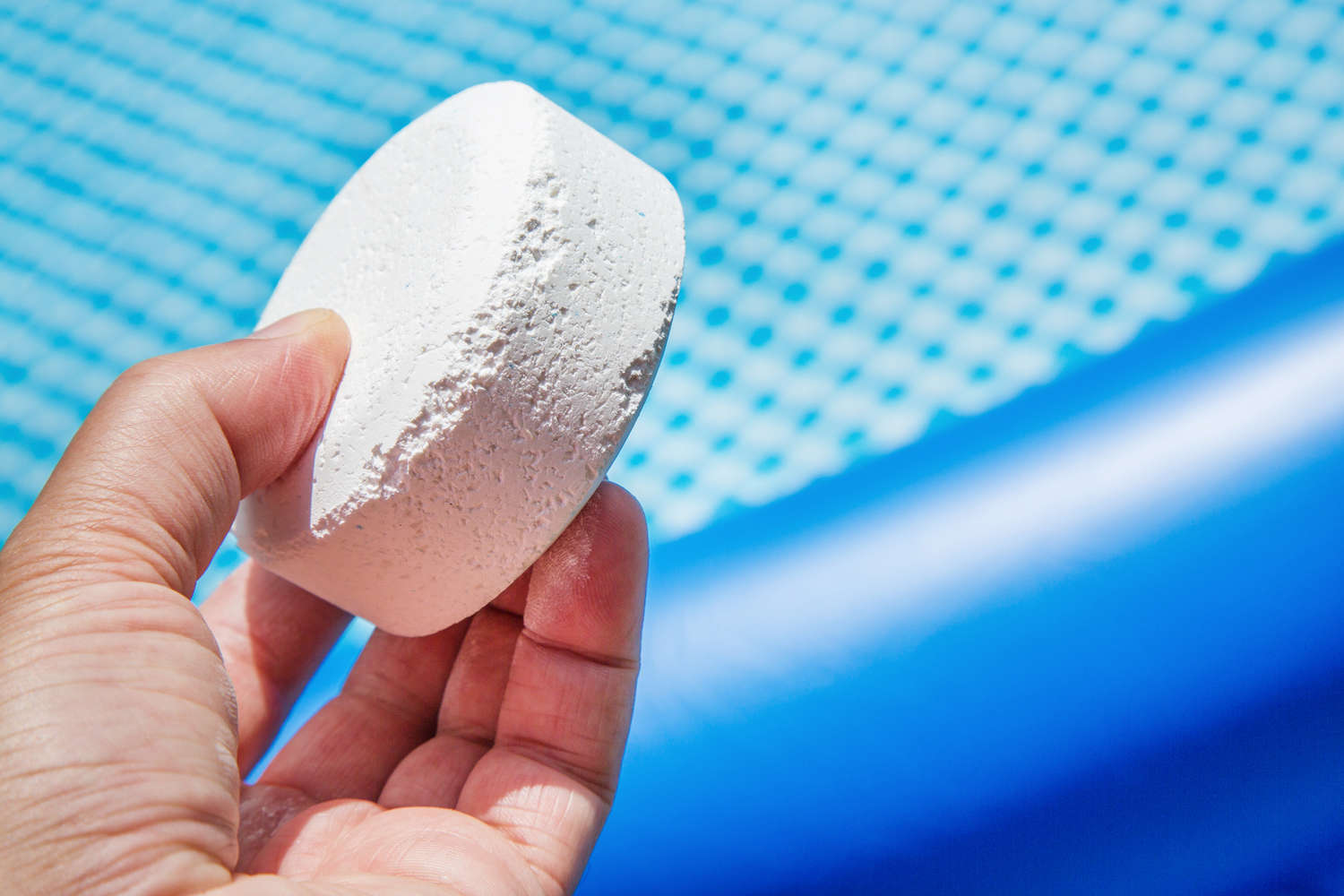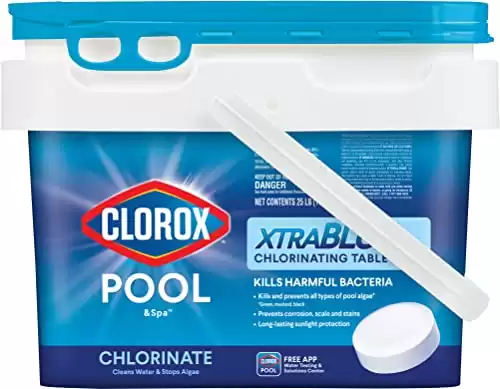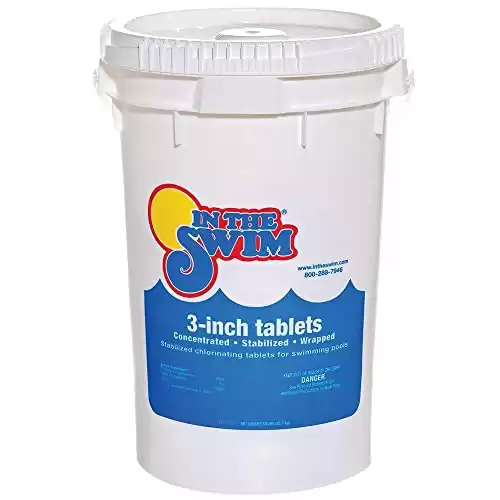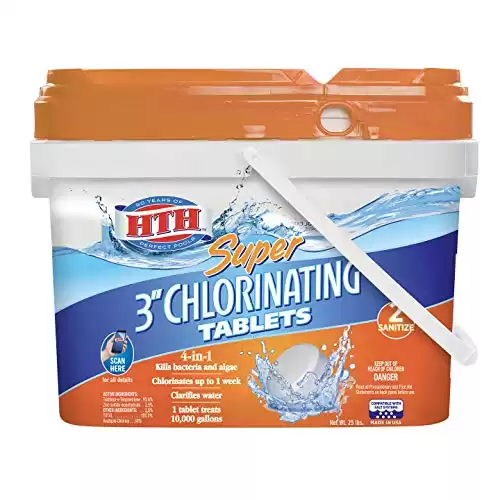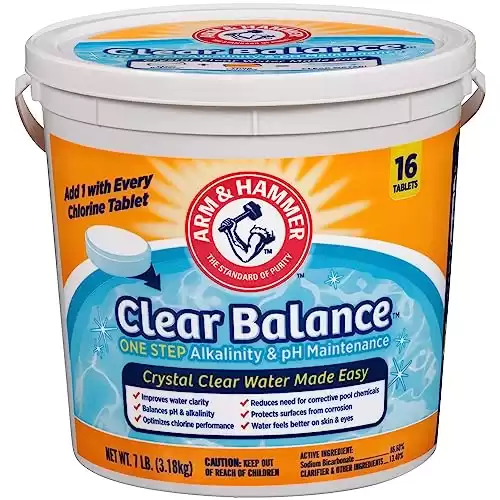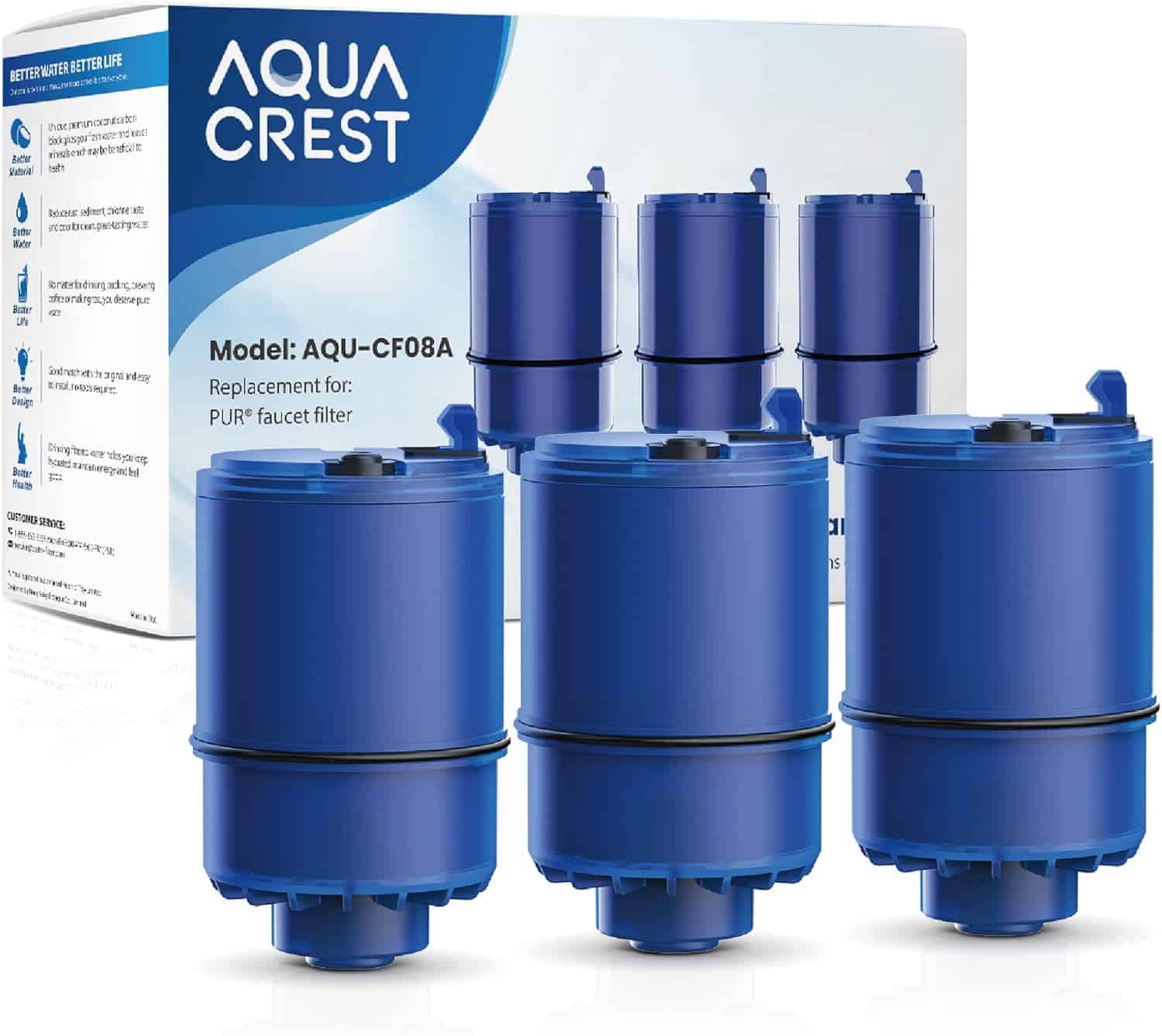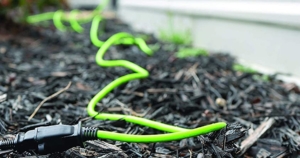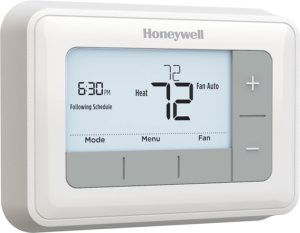The Ultimate Guide to Choosing the
Best Chlorine Tablets for Pool Maintenance
Having a clean and well-maintained pool is essential for every pool owner. Chlorine tablets play a role in maintaining the cleanliness and safety of your pool water. This guide will explore the key aspects to consider when choosing the best chlorine tablets for your pool maintenance needs. From understanding the different types of chlorine tablets to assessing factors like pool size, available chlorine content, dissolving speed, and more, we’ve got you covered. Let’s dive in!
What are Chlorine Tablets?
Chlorine tablets are a popular pool sanitizer that helps kill bacteria, algae, and other contaminants in pool water. These tablets are composed of concentrated chlorine and come in a solid form, typically in small discs or tablets. They dissolve gradually when added to the pool water, releasing chlorine to maintain the appropriate sanitization levels.
How do Chlorine Tablets Work?
Chlorine tablets work through a process called oxidation. As the tablets dissolve, they release chlorine molecules that react with organic matter in the pool, such as bacteria and algae. This chemical reaction breaks down the contaminants, keeping the pool water clean and free from harmful microorganisms.
Advantages of Using Chlorine Tablets
Using chlorine tablets for pool maintenance offers several advantages. Firstly, they provide a consistent and controlled chlorine release, ensuring a stable sanitization level. They are also convenient and easy to use, requiring minimal effort for application. Chlorine tablets have a longer shelf life than liquid ones, making them cost-effective for long-term pool maintenance.
Different Types of Chlorine Tablets
Here is a list of five top chlorine tablet brands for pool maintenance:
1. Clorox Pool & Spa XtraBlue Chlorinating Tablets
2. In The Swim 3-Inch Pool Chlorine Tablets
3. HTH Super 3-inch Chlorinating Tablets
4. Arm & Hammer Chlorinating Tablets
5. Rx Clear 1-Inch Stabilized Chlorine Tablets
There are different types of chlorine tablets available in the market. The most common ones include stabilized chlorine, unstabilized, and multi-functional chlorine tablets. Stabilized tablets contain cyanuric acid, which helps protect chlorine from degradation caused by sunlight. Unstabilized tablets, however, do not have cyanuric acid and are often used in indoor pools or those with automatic chemical feeders. Multi-functional tablets combine chlorine with additional chemicals, such as algaecides or clarifiers, offering a comprehensive pool maintenance solution.
| Product Image | Product Name / Price | Primary Button |
|---|---|---|
These top chlorine tablet brands are well-regarded for their quality, effectiveness, and reliability in maintaining clean and properly sanitized pool water. Remember to consider your pool’s specific needs and consult professional advice to determine the best option for your pool maintenance.
Factors to Consider When Choosing Chlorine Tablets
Pool Size and Volume
One factor to consider when selecting chlorine tablets is the size and volume of your pool. Larger pools require more chlorine to maintain the appropriate sanitization levels. It’s important to choose tablets that are specifically formulated for the size of your pool to ensure effective disinfection.
To figure out the size of a pool, you typically need to measure the pool’s length, width, and average depth. The following steps can help you calculate the pool size:
1. Measure the Length: Use a measuring tape or long measuring tool to measure the length of the pool from one end to the other. Measure along the longest straight line of the pool.
2. Measure the Width: Measure the width of the pool at the widest point. Again, use a measuring tape or long measuring tool to get an accurate measurement.
3. Determine the Average Depth: To determine the average depth of the pool, measure the depth at various points. Measure the depth at the shallow end and the deep end. Additionally, measure the depth at the midpoint between the shallow and deep ends. Add these measurements together and divide by the number of measurements taken to get the average depth.
4. Calculate the Pool’s Volume: Once you have the length, width, and average depth, you can calculate the pool’s volume. The formula to calculate the volume of a rectangular or square-shaped pool is length x width x average depth. If the pool has irregular or rounded shapes, you may need to use more complex formulas specific to the pool shape.
5. Convert the Volume: The volume of the pool is typically measured in cubic units (such as cubic feet or cubic meters). If needed, convert the volume to the desired units using appropriate conversion factors.
Keep in mind that these steps provide a general method for calculating pool size. If you have a complex pool shape or are unsure about the measurements, it’s advisable to consult a professional or refer to the pool manufacturer’s specifications for accurate information.
Available Chlorine Content
The available chlorine content refers to the concentration of active chlorine present in the tablets. It’s essential to check the label or product specifications to determine the percentage of available chlorine. Tablets with higher available chlorine content require less frequent application, making them more cost-effective in the long run.
Tablet Dissolving Speed
The dissolving speed of chlorine tablets can vary depending on the brand and formulation. Some tablets dissolve slowly over time, releasing chlorine gradually, while others dissolve more quickly. Consider the water flow in your pool and the tablet dissolving speed to ensure a consistent chlorine release and distribution throughout the pool.
Stabilizer Levels
Stabilizer, also known as cyanuric acid, helps protect chlorine from degradation caused by UV rays. If you live in a sunny area or have an outdoor pool, it’s crucial to maintain proper stabilizer levels. Some chlorine tablets come with a built-in stabilizer, while others require additional stabilizer to be added separately.
Chlorine Tablets Cost and Value for Money
When choosing chlorine tablets, comparing the cost and value for money is an important consideration. While it may be tempting to opt for the cheapest option, it’s essential to assess the tablets’ quality, concentration, and overall effectiveness. Investing in high-quality chlorine tablets will ensure optimal pool maintenance and reduce the need for additional chemical treatments.
Environmental Considerations
Considering the environmental impact of chlorine tablets is becoming increasingly important. Look for tablets formulated with environmentally friendly ingredients that have a minimal impact on the ecosystem. Some brands offer biodegradable chlorine tablets formulated with reduced chemical additives.
Storage Guidelines
Proper storage of chlorine tablets is essential to maintain their effectiveness and prevent deterioration. Store the tablets in a cool, dry place away from direct sunlight, moisture, and extreme temperatures. Follow the manufacturer’s instructions for specific storage guidelines.
Safety Precautions
Chlorine tablets are chemicals that require careful handling to ensure personal safety. Always wear protective gloves and goggles when handling chlorine tablets. Follow the manufacturer’s safety instructions and keep the tablets out of reach of children and pets.
Handling and Dosage Instructions
Follow the recommended dosage instructions provided by the manufacturer. Use a tablet dispenser or automatic feeder designed for chlorine tablets to ensure accurate and controlled dosing. Avoid direct contact with the skin or eyes when handling the tablets.
Proper Testing of Chlorine Levels
Regularly test the chlorine levels in your pool using a reliable testing kit or test strips. Maintain the chlorine levels within the recommended range to ensure effective sanitization and prevent bacteria and algae growth.
Balancing pH Levels
In addition to chlorine levels, maintaining proper pH levels for optimal pool water balance. Test the pH regularly and adjust it using pH increasers or decreases. Right pH balance enhances the effectiveness of chlorine and prevents issues like skin and eye irritation.
Monitoring Cyanuric Acid (Stabilizer) Levels
Regularly monitor the cyanuric acid levels in your pool. Cyanuric acid helps protect chlorine from degradation caused by sunlight but excessive levels can reduce its effectiveness. Maintain the recommended cyanuric acid range for optimal chlorine performance.
Alternative Pool Sanitization Methods
Saltwater Systems
When it comes to pool sanitation, chlorine tablets have long been the go-to method. However, an increasing number of pool owners are discovering the benefits of saltwater systems as an alternative. We will explore how saltwater systems work and highlight their advantages over traditional chlorine tablets. From reduced chlorine odor to potential cost savings in the long run, we’ll explore the benefits and considerations of embracing saltwater systems for a refreshing swimming experience.
How Saltwater Systems Work:
Saltwater systems, also known as salt chlorination systems or saltwater chlorine generators, use a process called electrolysis to convert salt into chlorine. The system consists of a salt cell, which is installed in the pool’s plumbing system, and a control unit. The salt cell generates chlorine as water passes through it, releasing a controlled amount into the pool. As the chlorine sanitizes the water, it eventually reverts back to salt through a natural chemical reaction, creating a self-replenishing cycle.
Advantages of Saltwater Systems:
1. Reduced Chlorine Odor: One of the major benefits of saltwater systems is the reduced chlorine odor compared to traditional chlorine tablets. While a faint scent of chlorine may still be present, it is noticeably milder, making swimming more enjoyable for individuals sensitive to strong chemical odors.
2. Gentler on Skin and Eyes: Saltwater systems are generally considered gentler on the skin and eyes compared to chlorine tablets. The lower chlorine concentrations produced by saltwater systems can help minimize skin dryness, itchiness, and eye irritation, providing a more comfortable swimming experience.
3. Continuous Chlorine Production: Unlike chlorine tablets that require regular manual dosing, saltwater systems continuously produce chlorine as needed. This ensures a consistent and controlled level of sanitization, reducing the risk of algae growth and other waterborne contaminants.
4. Cost Savings in the Long Run: While the upfront cost of installing a saltwater system may be higher than purchasing chlorine tablets, there can be cost savings in the long run. With a saltwater system, you eliminate the need to regularly purchase and store chlorine tablets, resulting in potential savings over time.
5. Convenience and Maintenance: Saltwater systems offer convenience and reduced maintenance compared to chlorine tablets. Once properly calibrated and set up, the system requires minimal monitoring and adjustment. Additionally, the self-cleaning feature of salt cells helps prolong their lifespan, reducing the frequency of cell replacements.
Considerations:
1. Initial Cost: Saltwater systems may have a higher upfront cost due to the equipment and installation expenses. However, the potential long-term savings can offset this initial investment.
2. Saltwater Corrosion: Saltwater can be corrosive, so it’s important to select pool materials that are compatible with saltwater systems. Certain metals and materials may require additional protection or maintenance to prevent corrosion.
3. Water Chemistry Monitoring: Although saltwater systems provide consistent chlorine production, it is still necessary to monitor and balance other water chemistry parameters, such as pH and alkalinity, to maintain optimal pool conditions.
Saltwater systems offer an appealing alternative to traditional chlorine tablets, providing a more pleasant swimming experience with reduced chlorine odor, gentler effects on the skin and eyes, and continuous chlorine production. While there are considerations to keep in mind, such as initial costs and water chemistry monitoring, the potential long-term cost savings and convenience make saltwater systems an attractive option for pool owners seeking a refreshing and low-maintenance alternative to chlorine tablets.
Ozone Generators
Ozone generators utilize the power of ozone, a highly reactive and powerful oxidizing agent, to sanitize pool water. Ozone is generated by passing oxygen molecules through a corona discharge or UV light, breaking them down into individual oxygen atoms. These atoms then recombine with other oxygen molecules to form ozone. The ozone produced is introduced into the pool water, where it eliminates contaminants by oxidizing organic matter, killing bacteria, viruses, and algae.
Benefits of Ozone Generators:
1. Enhanced Water Clarity: Ozone is highly effective at removing impurities and organic compounds that can cloud the water. By oxidizing and breaking down these particles, ozone generators help to improve water clarity, resulting in a visually appealing and inviting pool environment.
2. Reduced Chlorine Usage: Ozone generators provide an additional layer of sanitization, reducing the reliance on chlorine tablets. Ozone’s powerful oxidizing properties enable it to effectively destroy contaminants, meaning that less chlorine is needed to maintain proper sanitation levels. As a result, pool owners can significantly reduce their chlorine usage, which can be beneficial for individuals with chlorine sensitivity or those seeking to minimize the smell and taste associated with chlorine.
3. Enhanced Sanitization: Ozone is a potent sanitizer that can effectively eliminate a wide range of contaminants, including bacteria, viruses, and algae. By combining the sanitizing power of ozone with chlorine tablets, pool owners can achieve a higher level of water disinfection and minimize the risk of waterborne illnesses. This combination provides a robust and comprehensive sanitization approach, ensuring a safer and healthier swimming experience.
4. Odor and Chemical Reduction: Ozone’s oxidation process helps to break down and eliminate organic compounds that contribute to unpleasant odors. By reducing the presence of these compounds, ozone generators can help to minimize the typical chlorine smell associated with pool water. Additionally, the reduced reliance on chlorine tablets can result in a more balanced and pleasant water chemistry, enhancing the overall swimming experience.
Considerations:
1. Ozone Degradation: Ozone has a relatively short lifespan and dissipates quickly in the pool water. Therefore, ozone generators need to run continuously or at specific intervals to maintain consistent ozone levels in the pool.
2. Proper Ozone Levels: It is essential to monitor and maintain proper ozone levels in the pool to ensure effective sanitization without exceeding recommended limits. Ozone levels can be measured using appropriate test kits or instruments.
3. Ongoing Chlorine Use: While ozone generators can reduce chlorine usage, it is important to note that chlorine tablets still play a vital role in pool sanitization. Ozone generators act as a supplementary method, enhancing the overall effectiveness of the sanitization process.
UV Sanitizers
UV sanitizers utilize the germicidal properties of UV light to disinfect pool water. The sanitization process involves exposing the water to a specific wavelength of UV light, typically in the range of 254 nanometers. As water passes through the UV chamber, the UV light penetrates the cell walls of bacteria, viruses, and other microorganisms, disrupting their DNA and rendering them unable to reproduce. This effectively neutralizes these harmful organisms, preventing their proliferation in the pool water.
Advantages of UV Sanitizers:
1. Effective Disinfection: UV sanitizers provide a highly effective method of disinfection by neutralizing a broad spectrum of microorganisms, including bacteria, viruses, and algae. The germicidal properties of UV light offer a powerful and reliable means of sanitizing pool water, ensuring a clean and safe swimming environment.
2. Reduced Dependence on Chlorine: One of the key advantages of UV sanitizers is the reduced dependence on chlorine for pool sanitization. UV light is capable of destroying a significant portion of microorganisms in the water, reducing the reliance on chlorine as the primary disinfectant. This allows for lower chlorine levels in the pool, resulting in reduced chlorine usage, minimized chemical odor, and a more comfortable swimming experience.
3. Elimination of Chloramines: Chloramines, formed when chlorine combines with organic matter in the water, contribute to the distinct chlorine smell and can cause eye and skin irritation. UV sanitizers effectively break down chloramines, eliminating their presence in the pool water and reducing the associated odor and irritation. This enhances the overall swimming experience and promotes better air quality around the pool area.
4. Environmentally Friendly: UV sanitizers offer an environmentally friendly approach to pool sanitization. Unlike chlorine, which can introduce harmful byproducts into the environment, UV sanitizers use a chemical-free process that relies solely on UV light. This reduces the environmental impact associated with traditional chlorine-based methods and supports eco-conscious pool maintenance.
5. Low Maintenance and Operational Costs: UV sanitizers require minimal maintenance compared to chlorine-based systems. Once installed, UV systems typically operate continuously, requiring only occasional bulb replacement. Additionally, UV sanitizers consume minimal energy, resulting in lower operational costs over time.
Considerations:
1. Continuous Water Circulation: UV sanitizers are most effective when the pool water is consistently circulating through the UV chamber. Adequate water flow ensures that all water passing through the system receives sufficient exposure to the UV light for effective disinfection.
2. Complementary Chlorine Usage: While UV sanitizers reduce chlorine dependence, it is still advisable to maintain a minimal residual level of chlorine in the pool. This residual chlorine acts as a backup disinfectant and helps to control any microorganisms that may enter the pool after UV treatment.
Here is a list of common pool types and the corresponding chlorine tablet options:
1. Vinyl Pools: Vinyl pools are known for their smooth and non-porous surfaces. It is essential to use chlorine tablets specifically formulated for vinyl pools. Look for tablets that are slow-dissolving and compatible with vinyl liners to prevent potential damage or discoloration.
2. Fiberglass Pools: Fiberglass pools have a durable gel-coat finish that requires special care. Use chlorine tablets that are designed for use in fiberglass pools. These tablets are typically slow-dissolving and have a balanced formulation to prevent any adverse effects on the pool surface.
3. Concrete or Plaster Pools: Concrete or plaster pools are common in both residential and commercial settings. When selecting chlorine tablets for these pools, opt for stabilized tablets. Stabilized chlorine tablets contain cyanuric acid, which helps protect the chlorine from degradation due to sunlight exposure.
4. Saltwater Pools: Saltwater pools use salt chlorine generators to produce chlorine from salt in the water. However, it is still necessary to use some form of chlorine tablets as a backup or supplementary sanitizer. In saltwater pools, choose saltwater-compatible chlorine tablets specifically formulated for use with salt chlorine generators.
5. Above-Ground Pools: Above-ground pools have specific requirements due to their construction and materials. Look for chlorine tablets that are designed specifically for above-ground pools. These tablets are often slow-dissolving and can be used in floating dispensers or skimmer baskets.
6. In-Ground Pools: In-ground pools come in various types, such as vinyl, fiberglass, or concrete. The choice of chlorine tablets depends on the pool surface material. Refer to the specific recommendations mentioned above for the corresponding pool type.
Remember to always read the manufacturer’s instructions and consult with a pool professional to ensure you choose the appropriate chlorine tablets for your specific pool type.

